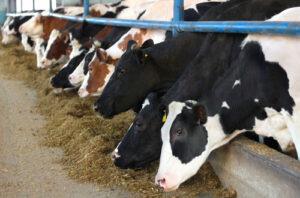
Bipartisan legislation introduced by U.S. Sen. Jerry Moran (R-KS) aims to reduce enteric methane emissions (CH4), which are emitted during the digestive process of dairy and beef cattle and account for the single largest source of agricultural methane emissions.
“New research and ranching practices are showing promising results to reduce methane emissions and keep our farms and ranches thriving,” Sen. Moran said on March 28. “This legislation will invest in further research and provide our producers with tools to improve their farms and ranches.”
If enacted, the Enteric Methane Innovation Tools for Lower Emissions and Sustainable Stock (EMIT LESS) Act of 2024, S. 4056, which U.S. Sen. Michael Bennet (D-CO) sponsored on March 22 alongside three original cosponsors, including Sen. Moran, would expand research at the U.S. Department of Agriculture (USDA).
The bill aims to spur the introduction of new products, such as feed additives; install practices that reduce these emissions; and create voluntary incentives through conservation programs to get these new products into the hands of farmers and ranchers, according to a bill summary provided by Sen. Moran’s staff.
Specifically, S. 4056 would require USDA’s Agricultural Research Service (ARS) to establish and operate laboratory and testing facilities to conduct studies toward enhancing the understanding of baseline enteric methane emissions and the safety and efficacy of enteric methane-mitigating products and practices, according to the text of the bill, and to develop the ongoing capacity of ARS personnel with expertise in conducting these studies and to regularly assess the impacts of CH4.
“This bill will help Colorado’s cattlemen and livestock producers access every available tool to voluntarily reduce methane emissions, expand research into this field, and improve the sustainability of their farms and ranches,” said Sen. Bennet.
The National Milk Producers Federation, Dairy Farmers of America, the National Council of Farmer Cooperatives, Danone North America, the American Feed Industry Association, the Food and Agriculture Climate Alliance, and the Breakthrough Institute support the measure.



